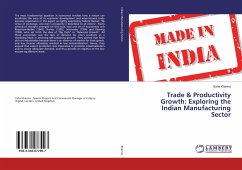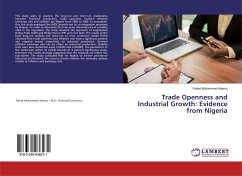
Trade & Productivity Growth: Exploring the Indian Manufacturing Sector
Versandkostenfrei!
Versandfertig in 6-10 Tagen
55,99 €
inkl. MwSt.

PAYBACK Punkte
28 °P sammeln!
The most fundamental question in economics involves how a nation can accelerate the pace of its economic development and international trade assumes importance in this aspect as rightly asserted by Federic Bastiat: "By virtue of exchange, one man's prosperity is beneficial to all others''. Many schools of thought emerged on this issue, and one set of economists was Rosentein-Rodan (1943), Nurkse (1955), Scitovosky (1954) and Fleming (1955), who set forth the idea of "Big Push" or "Balanced Growth". All these economists saw the lack of demand for one's products as a stumbling block in attaining...
The most fundamental question in economics involves how a nation can accelerate the pace of its economic development and international trade assumes importance in this aspect as rightly asserted by Federic Bastiat: "By virtue of exchange, one man's prosperity is beneficial to all others''. Many schools of thought emerged on this issue, and one set of economists was Rosentein-Rodan (1943), Nurkse (1955), Scitovosky (1954) and Fleming (1955), who set forth the idea of "Big Push" or "Balanced Growth". All these economists saw the lack of demand for one's products as a stumbling block in attaining self-sustaining growth. They opined that firms did not industrialize because there is an absence of market for their goods, and low income ultimately resulted in low industrialization. Hence, they argued that export promotion was imperative to promote industrialization and to create adequate demand, and thus provide an impetus to the low income equilibrium levels.












